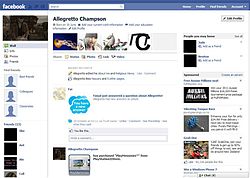Bad Apps and Bad Tags in Facebook
 Two different types of spam attacks are increasing right now on Facebook. All users need to know how to spot and prevent them – and to fix them if they happen.
Two different types of spam attacks are increasing right now on Facebook. All users need to know how to spot and prevent them – and to fix them if they happen.
Bad Apps
A bad app will appear in your newsfeed as a story that someone “likes” something that looks like a video or a link to a news story. However, if you click on it, it can take you through menu steps to actually install an “app,” or application or program in your Facebook which can collect your data. If you accidentally click on this and it hits your wall, you need to do the following to fix it. You can spot it because under the story, the link will say apps.facebook….
- Post on your news feed not to like the application you liked.
- Go to your applications and remove the application with that name. (Account, Privacy Settings, Applications – in lower left corner)
- Delete the news story that you “liked” the app from your wall. (Hover on “x” and click.)
Bad Tags
Check your profile daily and watch your photo strip – if you have been tagged in a new photo, it will appear on your filmstrip. Monitor your notifications. If you are tagged in any type of photo about stalkers or odd topic, it could be a spam attack. Do the following:
- Click on your photos on the left. There may be a link embedded in the photo you need to avoid at all costs. Do NOT click the link! Several names may be tagged in the photo. You will need to find your name and remove the tag. (Hint – if you want to quickly find your name, press CTRL-F and type your name to find it faster.) Do NOT click the embedded link. All you are doing here is removing the tag.
- Delete the news story from your news feed. (Hover on “x” and click.)
- Message the person who tagged you they have been spammed. Tell the person to go to 8 Steps to Stop and Fix Facebook Hacks.
- Post on your news feed not to click on a photo or video with the caption that was included.
- Continue to monitor your photo strip and notifications. The person who got spammed may get hit again if they don’t take appropriate preventative measures. Further, if you have mutual friends, your mutual friends may get hit with it as well.
(© 2011 Mary Biever)

